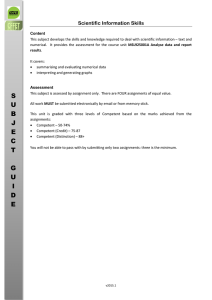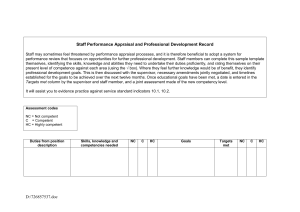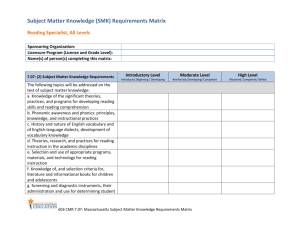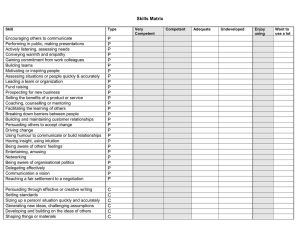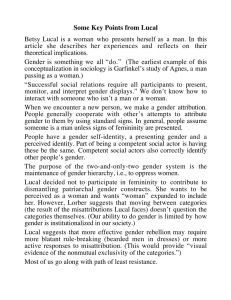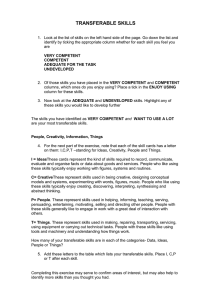Skills Audit for Researchers Section 1: Research Management Skills
advertisement
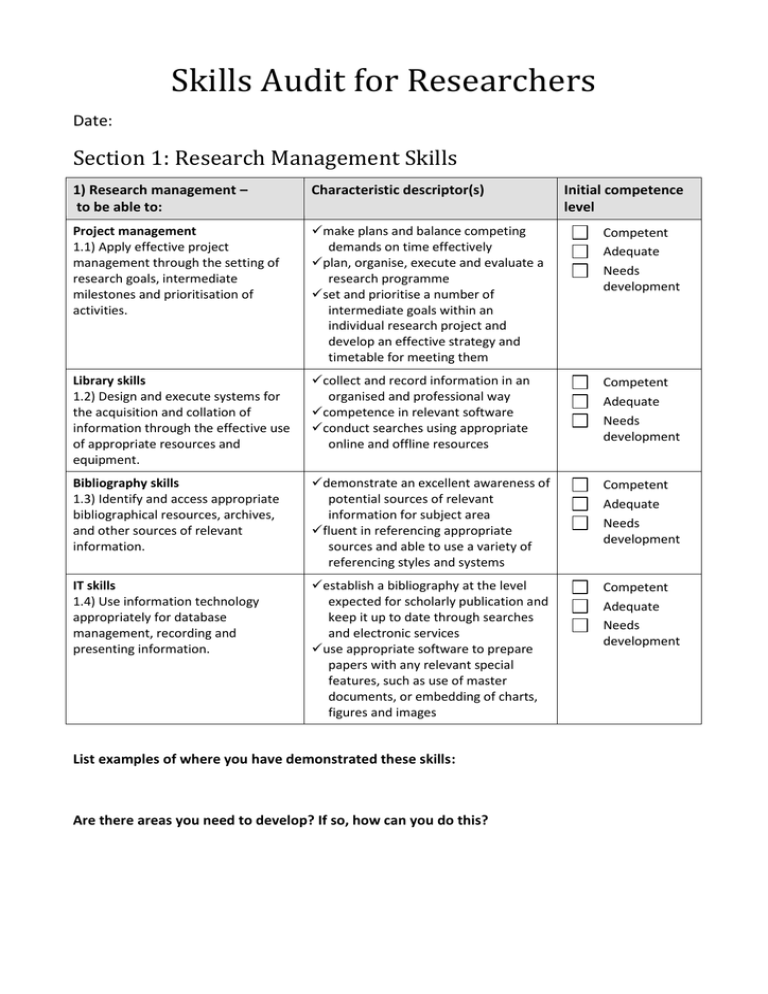
Skills Audit for Researchers Date: Section 1: Research Management Skills 1) Research management – to be able to: Characteristic descriptor(s) Project management 1.1) Apply effective project management through the setting of research goals, intermediate milestones and prioritisation of activities. make plans and balance competing demands on time effectively plan, organise, execute and evaluate a research programme set and prioritise a number of intermediate goals within an individual research project and develop an effective strategy and timetable for meeting them Competent Adequate Needs development Library skills 1.2) Design and execute systems for the acquisition and collation of information through the effective use of appropriate resources and equipment. collect and record information in an organised and professional way competence in relevant software conduct searches using appropriate online and offline resources Competent Adequate Needs development Bibliography skills 1.3) Identify and access appropriate bibliographical resources, archives, and other sources of relevant information. demonstrate an excellent awareness of potential sources of relevant information for subject area fluent in referencing appropriate sources and able to use a variety of referencing styles and systems Competent Adequate Needs development IT skills 1.4) Use information technology appropriately for database management, recording and presenting information. establish a bibliography at the level expected for scholarly publication and keep it up to date through searches and electronic services use appropriate software to prepare papers with any relevant special features, such as use of master documents, or embedding of charts, figures and images Competent Adequate Needs development List examples of where you have demonstrated these skills: Are there areas you need to develop? If so, how can you do this? Initial competence level Section 2: Skills of Personal Effectiveness 2) Personal effectiveness – to be able to: Characteristic descriptor(s) Willingness to learn 2.1) Demonstrate a willingness and ability to learn and acquire knowledge. identify and exploit sources of information or instruction on a new area excellent attendance at seminars, meetings and conferences Competent Adequate Needs development Creativity/originality 2.2) Be creative, innovative and original in one’s approach to research. find solutions to difficult problems develop new methodologies as required generate new ideas and approaches Competent Adequate Needs development Open-mindedness 2.3) Demonstrate flexibility and open-mindedness. analyse the strengths and weaknesses of one’s own approach willing to complement it by an engagement with other approaches Competent Adequate Needs development Self-assessment 2.4) Demonstrate self-awareness and the ability to identify own training needs. evaluate a wide range of skills, evaluate training needs in the light of this and the requirements of the research project, develop a coherent plan for future training Competent Adequate Needs development Self-discipline 2.5) Demonstrate self-discipline, motivation, and thoroughness. work to a professional level without supervision demonstrate high levels of accuracy, organisation and attention to detail Competent Adequate Needs development Awareness of support 2.6) Recognise boundaries and draw upon/use sources of support as appropriate. objectively consider gaps in knowledge, understanding or ability and be aware of possible sources of support such as the skills of colleagues Competent Adequate Needs development Self-reliance 2.7) Show initiative, work independently and be selfreliant. make and execute substantial research plans with guidance necessary only for specialist issues Competent Adequate Needs development List examples of where you have demonstrated these skills: Are there areas you need to develop? If so, how can you do this? Initial competence level Section 3: Communication Skills 3) Communication skills – to be able to: Characteristic descriptor(s) Academic writing 3.1) Write clearly and in a style appropriate to purpose, e.g. progress reports, published documents, and thesis. produce a well-structured and wellwritten report of substantial length write concise, academic prose and express ideas with suitable clarity full control over a variety of styles Competent Adequate Needs development Critical writing 3.2) Construct coherent arguments and articulate ideas clearly to a range of audiences, formally and informally through a variety of techniques. communicate own research orally and in written reports explain own research at a range of levels appropriate for e.g. international conference or nonspecialist audiences produce well-constructed, clear presentations using slides, for example, and use these confidently and easily in oral presentations provide feedback for own research subject of the kind expected in referees’ reports for journals and publishers and respond to such feedback Competent Adequate Needs development Research presentation skills 3.3) Constructively defend research outcomes at seminars and viva examination. present academic work at seminars and conferences fluently and confidently respond clearly and persuasively to questions and comments Competent Adequate Needs development Promote public understanding 3.4) Contribute to promoting the public understanding of one’s research field. write and present research in an appropriate manner for specialist or lay audiences Competent Adequate Needs development Teaching skills 3.5) Effectively support the learning of others when involved in teaching, mentoring or demonstrating activities. effectively impart information to others understand possibilities for supporting the learning of others Competent Adequate Needs development List examples of where you have demonstrated these skills: Are there areas you need to develop? If so, how can you do this? Initial competence level Section 4: Networking & Teamworking Skills 4) Networking and teamworking – to be able to: Characteristic descriptor(s) Networking 4.1) Develop and maintain co-operative networks and working relationships with supervisors, colleagues and peers, within the institution and the wider research community. regular attendance at conferences and meetings, awareness of researchers in research field Competent Adequate Needs development Teamworking 4.2) Understand one’s behaviours and impact on others when working in and contributing to the success of formal and informal teams. can work in teams (e.g. research groups) on complex projects and can both reflect on quality of teamwork and solve teamworking problems as they arise Competent Adequate Needs development Feedback Skills 4.3) Listen, give and receive feedback and respond perceptively to others. aware of techniques of giving feedback aware of others in research group give and receives feedback on regular basis Competent Adequate Needs development List examples of where you have demonstrated these skills: Are there areas you need to develop? If so, how can you do this? Initial competence level Section 5: Career Management Skills 5) Career management – to be able to: Characteristic descriptor(s) Professional development 5.1) Appreciate the need for and show commitment to continued professional development. active member of professional institution attend meetings, seminars and conferences organise events Competent Adequate Needs development Career management 5.2) Take ownership for and manage one’s career progression, set realistic and achievable career goals, and identify and develop ways to improve employability. aware of potential employers aware of general recruitment practices aware of and practise effective job hunting techniques Competent Adequate Needs development Transferable skills 5.3) Demonstrate an insight into the transferable nature of research skills to other work environments and the range of career opportunities within and outside academia. aware of potential career paths and the generic aspects of a PhD, including research techniques, project planning and communication skills Competent Adequate Needs development Promote oneself 5.4) Present one’s skills, personal attributes and experiences through effective CVs, applications and interviews. broad knowledge of types of CVs, interview techniques and standard questions and techniques such as psychometric testing aware of the variety of interview possibilities, including assessment centres Competent Adequate Needs development List examples of where you have demonstrated these skills: Are there areas you need to develop? If so, how can you do this? Initial competence level
